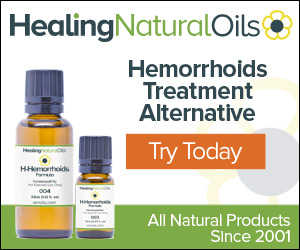Hemorrhoids are distended group of veins that are normally found in the rectal canal. Physiologically, they help the anal sphincters to hold the rectal wall and maintain continence while at rest. The hemorrhoidal plexus of veins become tortuous when there’s persistent increase in venous pressure from frequent straining and passing out of hard stool.
One factor could also be an increase in the intraabdominal pressure from pregnancy and child birth. Hemorrhoids have been a common finding in adults suffering from constipation and in multiparous women. It is frequently advised to leave the hemorrhoids alone if they are not causing any trouble such as pain, bleeding, and obstruction since these hemorrhoids that went out of their usual place can still play a role in maintaining continence. Once they become symptomatic, surgery becomes the best option for getting rid of it.
Although many people are afraid of surgical intervention, medicinal and supportive measures can also be used. Supportive treatment includes high fiber diet, stool softeners, and the use of suppositories. Frequent warm sitz bath along the perianal area helps soothe the pain and promotes better blood flow. Analgesics and anti-inflammatory agents may also be used.
Here are some examples of medical products that can be used for hemorrhoids.
Daflon 500 mg, is a vascular protective agent primarily used in chronic venous insufficiency and other varicosity from tortuous veins. Just like varicose veins found in the legs from prolonged standing, hemorrhoids are like these varicosities but is found in the rectum and anus. Daflon’s mode of action is to decrease venous distensibility and capacitance keeping the venous walls close together and not losing its original shape. It has anti-inflammatory properties to prevent activation and release of inflammatory factors and promote good blood flow.
Daflon appears to be very helpful in keeping a hemorrhoid as it is without worsening the condition. It is convenient for use as it is consumed orally twice a day with meals. During acute attacks of hemorrhoidal pain, 6 tablets daily are initially consumed and then weaned out after four days into 4 tablets, and then 2 tablets after three days. This drug has minimal side effects aside from the usual hypersensitivity to the active components of the drug. It should be used with caution during pregnancy since the drug has only been proven safe for use in child bearing animals and safety is not yet confirmed in humans. It is not yet also recommended for use during breastfeeding as further clinical trials must still be made to prove its safety during lactation. Furthermore, no known drug interaction has been reported.
Neo Healar is used as an herbal treatment of hemorrhoids made up of all natural ingredients that includes aloe vera, lupin oil extract, peppermint and bitter resin. Aloe vera helps decrease inflammation and promotes wound healing. The Lupin oil extract acts similarly like vitamin C and E but is believed to be more potent than the two with its superb wound healing and anti-oxidant effects.
Peppermint helps fight off itching and pain from the hemorrhoids with its cool and calming effect. The bitter resin has been used already for many centuries for the treatment of hemorrhoids and its mode of action is to support the immune system for healing and also has anti-inflammatory properties.
This herbal drug has both an ointment and suppository preparation. The ointment is used primarily to treat the hemorrhoid, with the suppository as a supportive agent. The ointment is applied on the affected area once or twice a day and is given up to three weeks before producing desired effects. The suppository may be used to lubricate the perianal area for smoother passage of stool and to avoid straining. Since this drug is all natural, minimal side effects may be experienced. It is not yet however clinically tested to be used in pregnant women. Therefore it is not advisable to be used during pregnancy and lactation.
Ginkor Fort is a vascular drug common for use in varicose veins and venous insufficiency. The drug’s active ingredients include ginkgo biloba, troxerutin and heptaminol hydrochloride. Ginkgo biloba is a known natural venous dilator that promotes good blood flow. Troxerutin is a flavonoid with anti-inflammatory and vasoprotective component. It protects the vascular walls from the body’s immune response attack and helps pull together distended venous walls.
This drug is consumed orally about 3-4 times daily for 7 days for relief of hemorrhoids. Since this drug contains a vasoconstrictor, blood pressure monitoring is important. Heptaminol may cause increase blood pressure from systemic vasoconstriction. This should also be used cautiously with anti-hypertensive medications and with anti-depressants such as monoamine oxidase inhibitors. This anti-hemorrhoid drug was found out to be safe for use in pregnant animals but not yet confirmed in humans. Therefore, use with pregnancy and breastfeeding just like in the first two drugs discussed, is not recommended.
In summary, hemorrhoids are venous varicosities along the rectal wall that may distend within the rectum or outside the anal canal. They help maintain anal continence during activity and rest. There is no need to get rid of the hemorrhoids if it does not cause any symptoms. Once it does, surgical intervention is still the best option. Recurrence is possible after surgery, and so supportive treatment and prevention through the use of venoprotective agents and stool softening remedies may be used to prevent recurrence.
For some hemorrhoids that are not that serious and cause only occasional discomfort, the above medical treatments may be used. Watch out if you’re hypersensitive to the components of the drug and choose a remedy that is convenient for use and that is as equally as or better than the others. Note of the drug’s mode of action and contraindications. Always seek professional medical help to be guided with the appropriate management. Certain confirmatory tests may also be done prior to the management. It is important to rule out other more serious pathologies like malignancy, infection and anorectal fistula among others prior to the treatment of hemorrhoids.


